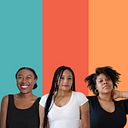What Happens When You Finally See Yourself Represented in the Media?
It’s not common that we see positive representation of Black women in the media but when we do, it’s beautiful.
When Beyoncé released “Brown Skin Girl” in 2020, it was the the love letter we never thought we needed. An affirmation that Brown skin is beautiful. Imagine if these were the messages young Black girls were given their entire lives? We would be unstoppable (somehow even more than we already are). But Brown Skin Girl is not the common messaging we see from the media.
Now we have shows like Insecure and Grownish that give Black audiences the joy and release they are looking for. Before there was Girlfriends, A Different World and movies like Cinderella with Brandy that paved the way for the positive representation for the current generation. Often times what we are fed is something based off a stereotype of Black people or Black trauma usually though slave stories or the civil rights era.
Shows like Atlanta and Insecure, whose audience is actually over 50 percent white, proved to TV networks that shows with a Black cast isn’t jus a “Black” show. Black entertainment wants to be consumed by everyone. Jordan Peele’s Get Out really transcended the ‘black movie’ in that more than Black people went to the theater to see it. Hollywood is now rushing to see if they can make the next Get Out that will shatter the box office after all the years of turning down and categorizing movies as “Black films.”
In a world where social media, consumes our lives, it’s also important that we tailer or feeds for positive representations of us and not images that make us feel bad. Instagram has become a platform to connect with other Black people and “Black Twitter” is a safe place for Black people on the internet.
In this episode, we discuss the growth of media representation for minorities over the years. The So-Called Oreos list the shows where we first saw ourselves represented. We question whether the rise of Black centered content is genuine and highlight that behind the scenes, media is still lacking minority representation. Rachel mentions the effect of media on Black women’s mental health and Janae explains what “adultification bias” is for Black women.
The So-Called Oreos Podcast is available on all podcast platforms! Please support by rating, following and leaving a review!
Join us on Discord!: discord.gg/d3RrepdTdQ
So-Called Oreos Club: www.joinclubhouse.com/club/so-called-oreos
Email: socalledoreos@gmail.com
Twitter: @socalledoreos
Instagram: @socalledoreos
Facebook: www.facebook.com/socalledoreos/
YouTube: bit.ly/3nutxC2
Audience Survey: bit.ly/2vOYtH9
